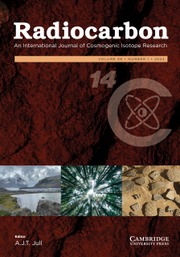Article contents
Radiocarbon Dating Problems Using Acetylene as Counting Gas
Published online by Cambridge University Press: 18 July 2016
Abstract
An investigation of inconsistent Hannover results in the International Collaborative Study (ICS) led to the conclusion that the main reason was contamination of the acetylene used as counting gas with recent and/or fossil carbon by the lithium used for its preparation. Despite the high level of purity of the lithium guaranteed by the producer and storage under argon in cans, different charges were partly covered with contemporary lithium carbonate and fossil oil sometimes was used to preserve the metal. Thorough cleaning of the surface of the lithium rods decreased the contamination but did not remove it entirely, which is evidenced in the wider scatter of the counting rates of various background gases than that of radiocarbon-free tank acetylene. As a result of the high risk of contamination with fossil and/or recent carbon from the acetylene counting gas, the high price of lithium, and the time-consuming preparation, the Hannover 14C Laboratory will use carbon dioxide instead of acetylene as counting gas in the future.
Information
- Type
- Session III
- Information
- Copyright
- Copyright © The American Journal of Science
References
- 5
- Cited by

